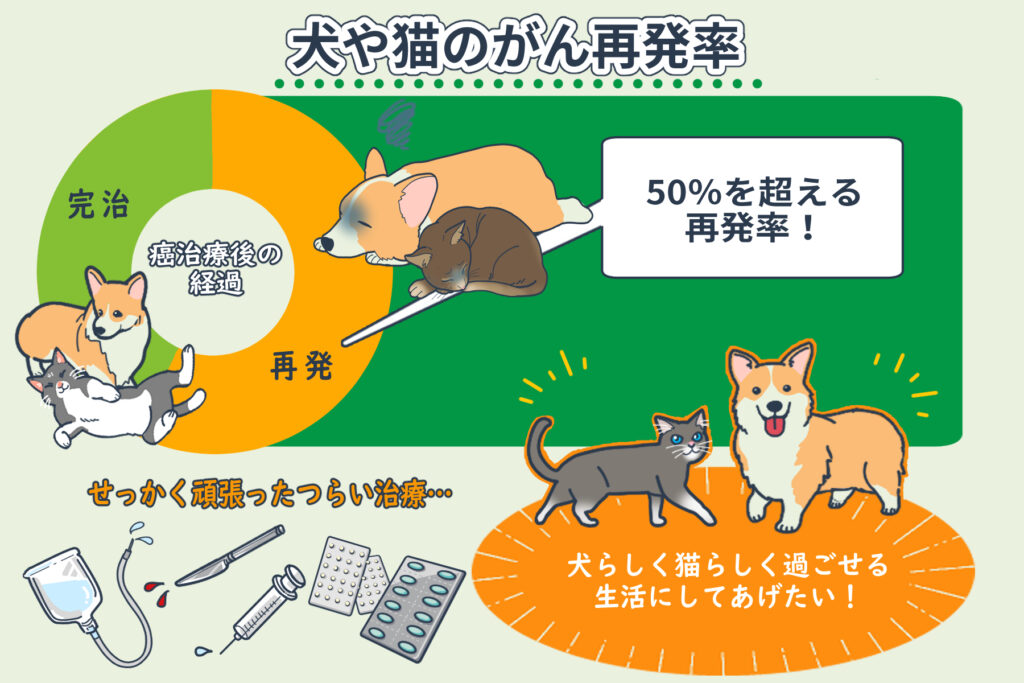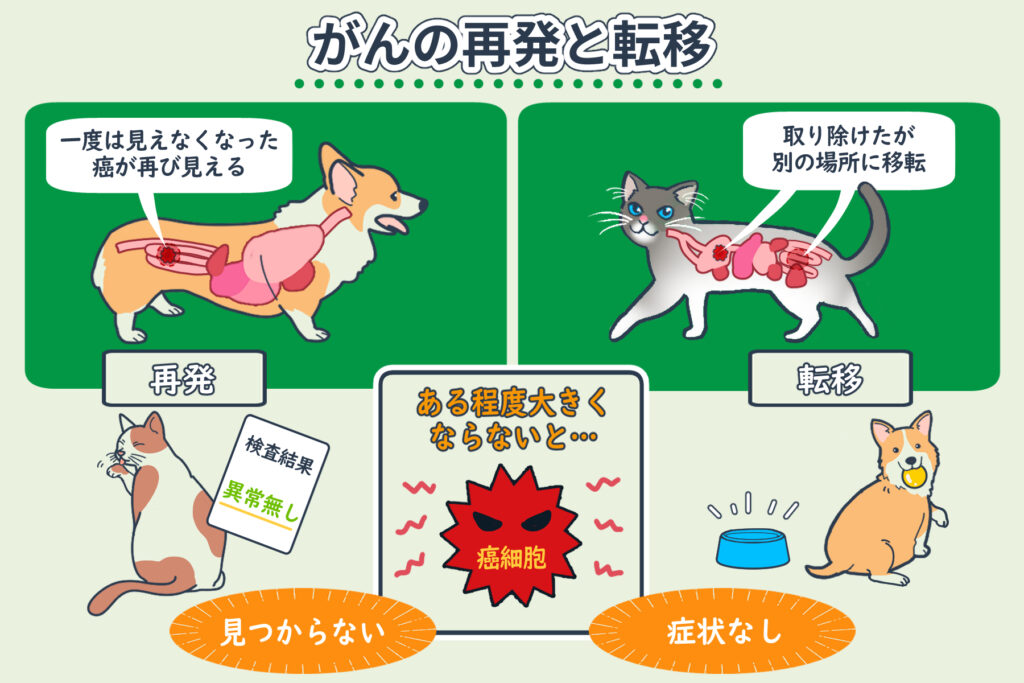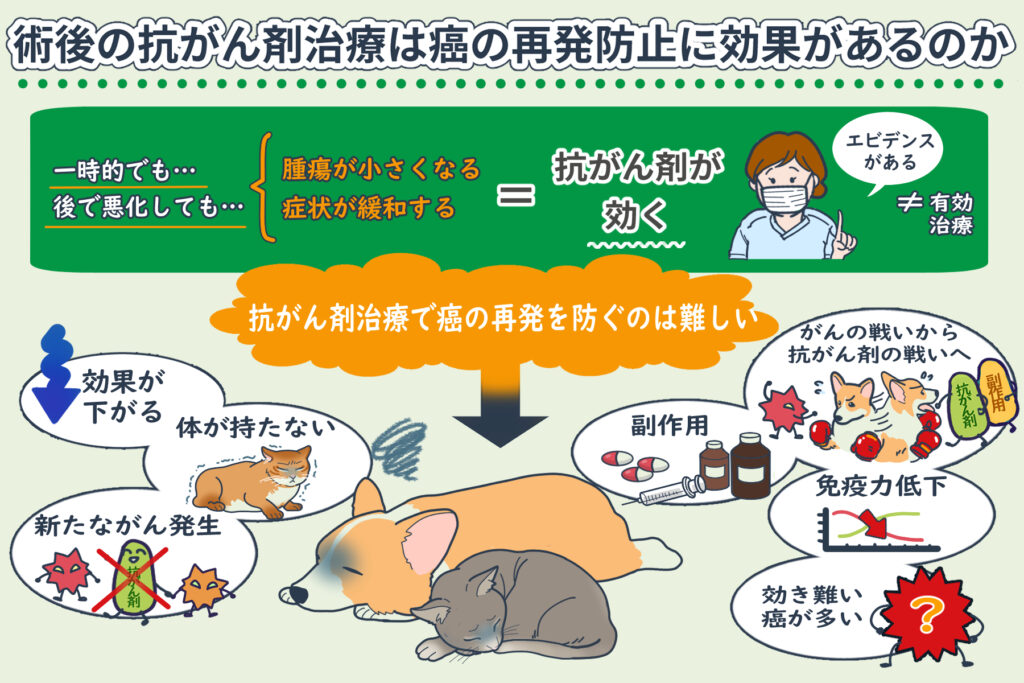We provide information to support your pet’s health>>
目次
- 1 Recurrence Rate of Cancer in Dogs and Cats After Treatment Exceeds 50%
- 2 What is Cancer Recurrence and Metastasis?
- 3 Why does cancer recur?
- 4 Is cancer recurrence inevitable?
- 5 Can Chemotherapy After Surgery Prevent Cancer Recurrence?
- 6 Why Some Dogs and Cats Do Not Have Cancer Recurrence
- 7 Immune Measures to Prevent Cancer Recurrence and Metastasis
Recurrence Rate of Cancer in Dogs and Cats After Treatment Exceeds 50%

Many cancers in dogs and cats tend to recur after treatment.
It appears that the recurrence rate of all cancers in dogs and cats exceeds 50%.
Why does cancer recur? Can it be dealt with using chemotherapy? Is there any way to prevent recurrence in the first place?
Due to the lack of correct information about cancer, pet owners are often unsure of what to do after their dogs or cats undergo cancer treatment. In reality, only a limited number of owners are taking proactive measures to prevent recurrence.
Many veterinarians are not taught how to reduce the recurrence rates of cancer in veterinary schools, so suggestions from veterinarians may be limited. Therefore, it is essential for pet owners to take the initiative in follow-up care and recurrence prevention after their pets have undergone cancer treatment.
But what can you do to prevent recurrence? We created this page to provide helpful information to those seeking ways to prevent recurrence.
Since your beloved dogs and cats have endured arduous treatments, we hope to find ways to reduce recurrence rates so that dogs can live as dogs and cats can live as cats.
We provide information to support your pet’s health>>
What is Cancer Recurrence and Metastasis?

When cancer, which had once disappeared after surgery or chemotherapy, becomes visible again, it is termed as cancer recurrence.
Even if cancer cells are present, if the mass is too small to be detected by tests, it is not regarded as a recurrence. If a large mass is overlooked, it is not considered a recurrence either, so the accuracy of diagnostic equipment and the skill level of the veterinarian can affect the timing of the recurrence diagnosis. When cancer recurs in the original site, it is called local recurrence, and when it recurs in a distant organ or lymph node, it is referred to as distant metastasis or simply metastasis.
For instance, if a melanoma surgery seems to have removed all the cancer, but a melanoma mass is found again within a few months, it is a recurrence. If cancer was completely removed in a mammary tumor surgery, but cancer metastasizes to the lungs six months later, that is metastasis.
Recurrences or metastases are not detected until the cancer has grown to some extent, and symptoms do not appear until it has reached a certain size, so it often goes unnoticed. Although undergoing detailed examinations every week might slightly advance the discovery time, in reality, even if recurrences or metastases are found a bit earlier, the subsequent prognosis does not change much.
This is the same for humans. Therefore, we do not perform monthly CT scans after cancer surgery just to detect recurrences or metastases early.
Especially in cases of distant metastasis, the cancer has already spread throughout the body via the bloodstream or lymphatic flow, arriving and growing in organs such as the lungs or liver. Therefore, it is reasonable to consider that the cancer is already widespread throughout the body, making it impossible to completely remove it through surgery.
When complete removal is difficult, usually chemotherapy and other treatments are administered. However, while chemotherapy might temporarily shrink the cancer or slow its progression, due to problems like drug resistance and side effects, it is insufficient to cure the cancer.
Providing information to support your pet’s health>>
Why does cancer recur?
The fundamental reason why cancer recurs or metastasizes in dogs and cats, despite treatment, is that cancer cells remain in the body.
- Recurrence after surgery… cancer cells are left behind.
- Recurrence after chemotherapy… cancer cells are not completely eradicated.
Leaving behind cancer cells is not uncommon at all.
Cancer causes early-stage small metastases (micrometastases). Therefore, even if the tumor (mass of cancer cells) is removed through surgery, it is not uncommon for tiny cancer cells to be left behind.
In cancers like malignant lymphoma, which responds well to chemotherapy, a state where cancer cells are removed (remission) can be achieved by examining the blood, but cancer cells hide in places other than the blood.
Moreover, even if the cancer is cleanly removed through surgery, the body of the dog or cat that developed cancer itself does not change at all, unless there is a conscious change in lifestyle habits.
In other words, even if the visible phenomenon of ‘cancer’ is removed, the fundamental work of creating an environment or constitution less prone to cancer has not been done, so the body remains susceptible to cancer.
Providing information to support your pet’s health>>
Is cancer recurrence inevitable?
So, is it inevitable for cancer to recur in dogs and cats? Is there no way to prevent cancer recurrence?
To prevent recurrence and metastasis, the remaining cancer cells in the body after surgery or chemotherapy need to be eradicated. Alternatively, creating an internal environment less prone to cancer should be prioritized.
Even if cancer cells cannot be completely eradicated, it is crucial not to increase the number of cancer cells. By keeping the cancer cell count low until the dog or cat reaches the end of its natural lifespan, recurrence can be prevented in effect.
Whether cancer recurrence and metastasis can be prevented depends on the dog or cat itself. It depends on the function of their immune system.
Not only humans but also dogs and cats have an immune system. Every day, hundreds or thousands of cancer cells are formed within the bodies of dogs and cats.
If the immune system is functioning properly, it can follow a process of detecting the formed cancer cells, attacking, and eliminating them to prevent the cancer from growing.
However, if the immune system’s function deteriorates due to various reasons, it becomes unable to detect cancer, weakens in its ability to attack it, or these functions might cease to operate entirely. When this happens, cancer cells continue to divide and increase.
The power of immunity is extremely important.
As pet owners, even if your beloved dog or cat has been diagnosed with cancer, rather than giving up and leaving it to fate, please start adopting good practices to support your dog or cat’s immune system.
Providing Information to Support Your Pet’s Health>>
Can Chemotherapy After Surgery Prevent Cancer Recurrence?

The reality is that it is challenging to prevent cancer recurrence with chemotherapy alone.
When asked, “What percentage of dogs and cats do you think survive because of chemotherapy after surgery?” many people believe it’s around 50%. Most people think it’s at least more than 30%.
However, in practice, it doesn’t prevent recurrence or metastasis in many cases. Veterinarians who understand the limitations of chemotherapy (truthfully) know that curing cancer with post-surgery chemotherapy is not easy.
Despite this, post-surgery chemotherapy is considered standard treatment, which can be misleading for pet owners.
It is important to note that the “effectiveness” of chemotherapy does not mean curing cancer. The effectiveness of chemotherapy means the following (in the case of solid tumors):
“If the tumor shrinks temporarily, it is considered effective. Even if it worsens later, it is still considered effective. Even if it only alleviates symptoms, it is considered effective. Whether or not it prolongs life is not questioned.”
You may wonder if continuously using chemotherapy to keep the tumor small is beneficial. However, there are several reasons why it is difficult to continue chemotherapy for many years:
- Cancer acquires resistance to chemotherapy, making it less effective over time.
- The side effects of chemotherapy are severe, and the body cannot tolerate long-term administration.
- As is often stated, chemotherapy can act as a carcinogen, potentially causing new cancers.
- While it may prolong life in some cases, it can also shorten it. Death from side effects is possible.
- The battle against cancer often becomes a battle against chemotherapy itself.
- Chemotherapy almost inevitably lowers the immune system.
- Many cancers are inherently resistant to chemotherapy.
In the case of blood cancers, chemotherapy often responds well and remission can last a long time. However, for solid tumors like mammary tumors, melanoma, squamous cell carcinoma, and mast cell tumors, the response to chemotherapy is generally poor. Thus, it is questionable how much additional benefit post-surgery chemotherapy provides in preventing recurrence or metastasis.
In some cases, the side effects of chemotherapy may worsen the suffering, ultimately lowering the quality of life (QOL) of the dog or cat.
For these reasons, I suggest gathering information and carefully considering the decision to use chemotherapy after surgery, consulting with multiple veterinarians. I hope you will receive treatment without rushing and with full understanding to avoid regretting later that you “didn’t know” about the effects and side effects of chemotherapy.
Sometimes you may hear that there is evidence (scientific basis). When you hear “there is evidence,” it seems appealing, but it does not mean it is an effective treatment.
It means there is solid data. Sometimes, the data might say “10% of dogs and cats benefited, but 90% saw no benefit.” Even so, it constitutes as evidence.
Providing Information to Support Your Pet’s Health>>
Why Some Dogs and Cats Do Not Have Cancer Recurrence
The reason why cancer does not recur or metastasize after treatment is that even if cancer cells remain after surgery or chemotherapy, the dog or cat themselves can suppress the proliferation of cancer cells and prevent recurrence and metastasis. This is the effect of the “immune system” that everyone is familiar with.
Postoperative immune status significantly affects the recurrence rate. It can be said that maintaining a good immune system is the most crucial factor in preventing cancer recurrence and metastasis.
Japanese people tend to underestimate the importance of immunity and place more emphasis on medical treatment. However, medical treatment is essentially a support for the body’s self-healing power. Many chronic diseases are cured by the body’s own healing power (immunity).
In any case, improving the immune system is essential. Dogs and cats with a well-maintained immune system are likely to have a lower recurrence rate.
There are many ways to boost immunity, including proper nutrition from a good diet, exercise, and stress management. Many of these measures can be done at home without the help of a veterinarian.
Please take the time to review and improve your current lifestyle habits.
Providing Information to Support Your Pet’s Health>>
Immune Measures to Prevent Cancer Recurrence and Metastasis
There have been many reports that even cancers that tend to recur within a few months to a year post-surgery, such as malignant lymphoma, mammary tumors, melanoma, and sarcomas, can be managed to prevent recurrence and metastasis for several years through proper immune measures.
Cordy is expected to help balance the immune system and maintain the health of your dogs and cats. Our laboratory is conducting research on the effectiveness of Cordy in adjusting immune function.
Many veterinarians and pet owners have reported long-term survival cases and maintained vitality and appetite after cancer treatment when using Cordy.
If your beloved pet cat is diagnosed with cancer, we highly recommend considering proactive immune-boosting measures.
If you have any questions, please contact us.
監修獣医師:林美彩 所属クリニック:chicoどうぶつ診療所

代替療法と西洋医学、両方の動物病院での勤務経験と多数のコルディの臨床経験をもつ。 モノリス在籍時には、一般的な動物医療(西洋医学)だけでは対応が困難な症例に対して多くの相談を受け、免疫の大切さを痛烈に実感する。
ペットたちの健康維持・改善のためには薬に頼った対処療法だけではなく、「普段の生活環境や食事を見直し、自宅でさまざまなケアを取り入れることで免疫力を維持し、病気にならない体づくりを目指していくことが大切である」という考えを提唱し普及活動に従事している。
所属:





